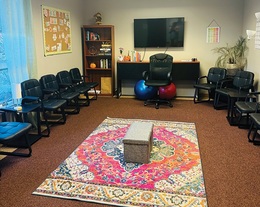
When struggling with addiction and mental health disorders, the road to successful recovery is rarely an easy journey. Individuals facing these issues need a support system that works, with personalized treatment programs guided by compassionate professionals who are experienced in tackling the physical, emotional and psychological aspects of these life challenges.
Fortunately, that is exactly what one will find at Clear Direction Recovery Centers and Peak Mental Health & Wellness. The two Evesham Township facilities, which are both owned by individuals who have been personally affected by mental health and addiction issues, work in tandem to best support patients as they reclaim their life in recovery.
At Clear Direction Recovery Centers, individuals will begin their recovery by tackling their addictions and finding a path to sobriety. From there, they can move on to a program at Peak Mental Health & Wellness, where they further learn how to best manage their mental health.
An Individualized Plan
“I never want a patient to feel like they’re just a number. We personalize the treatment plan and assign certain staff that will hone in on personal needs,” Natasha Davalt, Clear Direction Recovery Center’s executive director, says.
Clear Direction’s counselors offer a combined 40 years of experience, and all hail from different educational and counseling backgrounds.
“They’ve all studied under different realms which I think adds a lot of diversity. The execution of the groups they have and the interventions they use with patients is vast,” Davalt says.
At Clear Direction, there is group therapy, family therapy and individual therapy, and these offerings are personalized as counselors get to know a patient. Family therapy may be once a week for some, while others only need it once a month. Individual therapy is once a week, along with the option for two additional personalized sessions. Everyone attends group therapy five days a week, with morning and evening programming available.
The group therapy is not one-size-fits-all either, according to Davalt, who explains that this therapy naturally involves mental health and recovery topics, but it also dives into life skills, such as medication management and cultural competence.
“We try to diversify all of our approaches,” Davalt says. “So if someone doesn’t want to own that they’re an addict one day and they just want to focus on that they’re an anxious person, they’re not inundated by one-sided curriculums.”
Prioritizing Mental Health
While there may be similar mental health treatment centers out there, none are quite like Peak Mental Health & Wellness. That’s primarily due to the intensive nature of the facility’s program, along with its highly individualized approach.
“The last thing we want to do is some version of cookie-cutter treatment,” Executive Chief Officer Michael Darling says. “We really try to meet a patient where they’re at and see what their goals are.”
Similar to Clear Direction, Peak Mental Health & Wellness offers weekly individual sessions with a primary therapist, as well as an individual session with a case management worker and, if needed, a medication management session with an APN. There are daily group therapy sessions as well.
“Everyone’s story is a little bit different. What we’re trying to do in those group sessions is we’re trying to fill up their tool bucket with the different tools that they need to cope with whatever their backstory is,” Darling explains.
Bridging the Gap
Darling likens the relationships between addiction and mental health disorders to the age-old question of what came first, the chicken or the egg?
“For example, let’s say there’s a patient with severe depression, anxiety and PTSD. They’re drinking because of it. The mental health might be causing the drinking, but the drinking might be the primary thing to address first to get them stabilized,” Darling says.
The first 90 days, on average, a patient with Clear Direction Recovery Centers is embracing sobriety and abstinence. They develop healthy coping skills and recovery tactics. They address family discord.
“Then, going forward, is the crux of what caused their dependence on substances in the first place—lack of mental health management,” Davalt says. “The mental health diagnosis doesn’t go away. We have to help you manage that, and that’s transitioning over to Peak Mental Health.”
Both facilities also offer alumni associations to graduated patients, where they can continue to be part of the community long term. There are biweekly meetings for support, and social outings are held monthly.
“It’s to unify and remember where we came from and that we’re proud of our resilience. But we try to normalize it. It’s not their entire identity,” Davalt says.
“I’m proud that’s a part of our program and something that we offer. The people when they first come in, they’re very vulnerable,” Darling adds. “For us to be able to continue down the road where we have this network, I think it’s something special that we do.”
Clear Direction Recovery Centers
Marlton
(888) 540-0122 | ClearDirectionNJ.com
Peak Mental Health & Wellness
Marlton
(609) 354-5688 | MentalHealthPeak.com
Click here to subscribe to the free digital editions of South Jersey Magazine
To read the digital edition of South Jersey Magazine, click here.
Published and copyrighted in South Jersey Magazine, Volume 21, Issue 8 (November 2024)
For more info on South Jersey Magazine, click here.
To subscribe to South Jersey Magazine, click here.
To advertise in South Jersey Magazine, click here.












